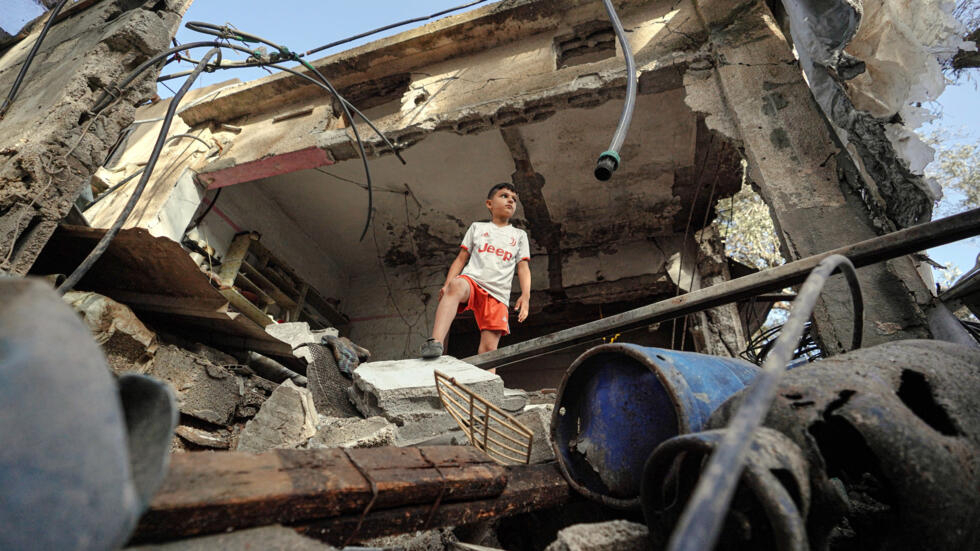
A Palestinian man and his children inside a building that was hit by an Israeli airstrike in Rafah in the southern Gaza Strip. (Photo: AFP/Eyad Al-Baba)
Israel bombed the Gaza Strip, including Rafah, on Saturday, despite an order from the UN’s top court for it to “immediately halt” its military offensive in the southern city.
At the same time, renewed efforts are getting underway in Paris aimed at securing a ceasefire in the war sparked by Palestinian militant group Hamas’s unprecedented October 7 attack on Israel.
In a case brought by South Africa alleging the Israeli military operation amounts to “genocide”, the International Court of Justice ordered Israel to halt its Rafah offensive and demanded the immediate release of hostages still held by Palestinian militants.
The Hague-based ICJ, whose orders are legally binding but lack direct enforcement mechanisms, also instructed Israel to keep open the Rafah crossing between Egypt and Gaza, which Israel closed before sending troops and tanks into the besieged city and crossing earlier this month.
Israel gave no indication it was preparing to change course in Rafah, insisting the court had got it wrong.
“Israel has not and will not carry out military operations in the Rafah area that create living conditions that could cause the destruction of the Palestinian civilian population, in whole or in part,” National Security Adviser Tzachi Hanegbi said in a joint statement with Israel’s foreign ministry spokesman.
Hamas, the Iran-backed Islamist group that has ruled Gaza since 2007, welcomed the ICJ ruling on Rafah but criticised its decision to exclude the rest of the Palestinian territory from the order.
– ‘Nothing left here’ –
In spite of the ICJ ruling, Israel carried out strikes on the Gaza Strip on Saturday morning as fighting raged between the army and Hamas’s armed wing.
Palestinian witnesses and AFP teams reported Israeli strikes in Rafah and the central city of Deir al-Balah.
“We hope that the court’s decision will put pressure on Israel to end this war of extermination because there is nothing left here,” said Oum Mohammad Al-Ashqa, a Palestinian woman from Gaza City displaced to Deir al-Balah by the war.
Mohammed Saleh, also interviewed by AFP in the central Gazan city, said, “Israel is a state that considers itself above the law. Therefore, I do not believe that the shooting or the war will stop other than by force.”
In its ruling, the ICJ said Israel must “immediately halt its military offensive, and any other action in the Rafah Governorate, which may inflict on the Palestinian group in Gaza conditions of life that could bring about its physical destruction in whole or in part”.
It ordered Israel to allow UN-mandated investigators “unimpeded access” to Gaza to look into the genocide allegations.
It instructed Israel to open the Rafah crossing for the “unhindered provision at scale” of humanitarian aid and also called for the “immediate and unconditional release” of the hostages held by Hamas in Gaza.
The Gaza war broke out after Hamas’s October 7 attack resulted in the deaths of more than 1,170 people, mostly civilians, according to an AFP tally based on Israeli official figures.
Militants also took 252 hostages, 121 of whom remain in Gaza, including 37 the army says are dead.
Israel’s retaliatory offensive has killed at least 35,857 people in Gaza, mostly women and children, according to data from the Hamas-run territory’s health ministry.
The Israeli military said on Friday the bodies of three hostages — the Israeli Chanan Yablonka, Brazilian-Israeli Michel Nisenbaum and French-Mexican Orion Hernandez Radoux — were recovered in Gaza’s north.
– Paris meetings –
Israel has come under mounting international pressure over its Gaza offensive.
The ICJ ruling came days after Ireland, Spain and Norway said they would formally recognise a Palestinian state next week and the International Criminal Court prosecutor requested arrest warrants for Israeli Prime Minister Benjamin Netanyahu and top Hamas leaders on suspicion of war crimes and crimes against humanity.
On the diplomatic front, efforts have resumed to seek the first ceasefire in Gaza since a week-long truce in November that saw more than 100 hostages released in exchange for 240 Palestinian hostages held in Israeli jails.
CIA chief Bill Burns was expected to meet Israeli representatives in Paris in a bid to relaunch negotiations, a Western source close to the issue said.
Separately, French President Emmanuel Macron received the prime minister of Qatar and the Saudi, Egyptian and Jordanian foreign ministers on Friday “to press for a ceasefire”, according to Cairo.
The French presidency said they held talks on the Gaza war and ways to set up a Palestinian state alongside Israel.
Top US diplomat Antony Blinken also spoke with Israeli war cabinet minister Benny Gantz about new efforts to achieve a ceasefire and reopen the Rafah border crossing, Washington said.
Ceasefire talks involving US, Egyptian and Qatari mediators ended shortly after Israel launched the Rafah operation, though Netanyahu’s office this week said the war cabinet had asked the Israeli delegation “to continue negotiations for the return of the hostages”.
– ‘End this nightmare’ –
Israeli ground troops started moving into Rafah in early May, defying global opposition. It has since ordered mass evacuations from Rafah, with the UN saying more than 800,000 people have fled.
Troops took over the Palestinian side of the Rafah border crossing with Egypt, further slowing sporadic deliveries of aid for Gaza’s 2.4 million people.



